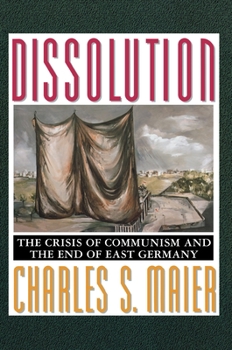Dissolution: The Crisis of Communism and the End of East Germany
Select Format
Select Condition 
Book Overview
Against the backdrop of one of the great transformations of our century, the sudden and unexpected fall of communism as a ruling system, Charles Maier recounts the history and demise of East Germany.... This description may be from another edition of this product.
Format:Hardcover
Language:English
ISBN:0691078793
ISBN13:9780691078793
Release Date:April 1997
Publisher:Princeton University Press
Length:464 Pages
Weight:1.89 lbs.
Dimensions:1.4" x 7.8" x 10.0"
Customer Reviews
3 ratings
Excellent
Published by Thriftbooks.com User , 22 years ago
This is a very interesting book on the collapse of East Germany (the German Democratic Republic; GDR) at the end of the Cold War. Maier is a distinguished scholar who uses the example of the GDR to explore the factors and specific events leading to the fall of the communist states of eastern Europe. The book includes a careful and insightful of the nature of repression in the GDR and how the organization of the state and society gradually undermined the legitimacy of the state. There is also a fine analysis of the economic factors that led to the economic crisis that precipitated the crisis of communism at the end of the Cold War. Maier uses a comparative approach to show differences between the GDR and the failure of neighboring states in eastern Europe, mainly Poland and Czechoslovakia. He is very good on showing both the common features and the specific and important differences between these nations and how these differences resulted in the different character of state collapse in these nations. The common factors he isolates, however, can be taken as the underlying causes of the collapse of all the communist states. This analysis is interwoven with a detailed and very readable narration of the unraveling of the GDR and its subsequent absorption into a unified Germany dominated by the old West Germany. This book reveals a large number of remarkable ironies. We have the spectacle of the aged GDR leadership requiring the censorship of Soviet publications to prevent ideological contamination of the GDR by reformist ideas. The same leadership, however, borrowed excessively from Western banks and governments in an effort to raise living standards in the GDR and then concealed the extent of the debt from their Soviet partners. Probably the only time the people of the GDR had real freedom of action was after the Soviets relinquished their control and mass demonstrations were key factors in bringing down the GDR. Once the communist state was destroyed, however, unification became inevitable and terms of unification were dictated by the West Germans.This book does have some shortcomings. This is not a history of the collapse of communism as a whole, so there is no treatment of events in the Soviet Union except as how they impinge on the GDR. It is very clear that the actions of Soviet leaders, particularly Gorbachov, were critical. Once the Soviet leadership made clear that they would not back up the use of force to prevent the fall of the GDR, it was over for the communists of the GDR. This is kind of like analyzing the movement of the moons of Jupiter through the Solar System without analyzing the movement of Jupiter itself. Several chapters contain asides in which Maier departs from his main narrative or analysis to pursue somewhat tangential themes. These asides vary in quality. For example, his discussion of the differences between attempted revolutions in Germany and those in France and England is interesting. His suggestion,
fascinating account of the implosion of a state
Published by Thriftbooks.com User , 25 years ago
I thoroughly enjoyed reading this excellent book on the collapse of East Germany. The description of what exactly went on in the different parts of the population and especially at Politburo level, using a wealth of recently opened sources, makes for fascinating reading. The dynamics of the rapid breakdown feel like an snowball tunging into an avalanche, leaving the leadership in total bewilderment and disarray. To the eternal credit of Gorbatsov, who made clear he would not support the DDR in military action, no bloody attempt to repression ensued, and so one of the most pervasive and controlled police states ever created melted away. It is also thought-provoking on the subject of what constitutes a state; it is essentially a psychological concept, and if enough people stop believing in that state, the state effectively stops functioning and exists no more.The whole story is better than fiction, it is reality. Highly recommended.
Excellent, detailed account of the end of the GDR
Published by Thriftbooks.com User , 26 years ago
Professor Maier does an excellent job of giving an accurate, researched and detailed account of the end of the "first socialist state on German soil". Although not a consummate expert on the subject and certainly not a contemporary historian at heart, Professor Maier succeeds in presenting a readable and fascinating book. The text could stand to be slightly less academic -- the long section on the nature of revolutions is, in my opinion, a bit tedious. Nevertheless an excellent account, certainly the best one in English, for scholars and laypersons alike.






